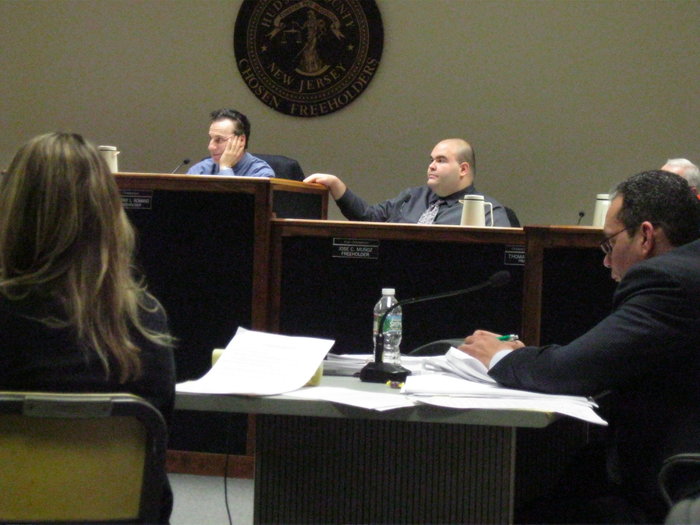The Hudson County Board of Freeholders adopted the $495 million 2013 county budget at its June 13 meeting after cutting more than $4 million from the budget proposed in early May.
As approved, the budget is an increase of 3.19 percent from last year.
The original budget called for a $12,787,530 increase in the overall county tax levy, an increase of about 4.39 percent.
Along with its budget plan, the administration had anticipated seeking the usual one-penny per hundred dollars of assessed value for the annual Open Space tax levy to fund projects supported by the Hudson County Open Space and Historic Preservation Trust from the Board of Chosen Freeholders.
In order to reduce the negative impact from the budget increase, the Freeholders along with County Executive Tom DeGise, scaled back the tax levy imposed for Open Space projects from $5,620,920 to approximately $1,124,124.
The reduced amount will cover debt service on existing projects under construction, but will not fund any new projects in 2013.
DeGise’s office said these changes should meet the demands of the mayors of Weehawken, Hoboken, and Secaucus whose towns were most impacted by this year’s tax increases.
Under a formula imposed on county governments by the state, towns that have the most new development in a given year pay a greater share of overall taxes. This year Weehawken, Hoboken, and Secaucus saw increases because real property values climbed compared to the other towns in Hudson County, leading to their communities facing double-digit-percentage increases in county taxes.
In the originally proposed budget, Hoboken, Secaucus, and Weehawken were faced with county tax increases of 10 percent, 9.5 percent, and 19.6 percent respectively. The mayors of the three towns opened a dialogue with the Freeholders and the County Executive seeking to reduce the impact.
The Freeholders agreed to hold public hearings in both Hoboken and Secaucus so that residents could ask questions and make suggestions as well as comment on the county budget.
Freeholder Chairman Anthony Romano called these sessions “eye opening,” not merely because of some of the excessive costs these hearings uncovered, but also because the Freeholders got another perspective on the budget increases’ impact on local communities.
Freeholder Bill O’Dea said for the first time department heads were grilled extensively and line items examined on levels like never before.
“This has been the most intensive budget process in history in my 17 years as Freeholder,” O’Dea said. “We examined line items; we looked at individual overtime costs, and post assignments. This is a very good way to do things and how we should do things in the future.”
Departments were required to justify their spending and trip expenses, including some of the more sacred cows—such as the Hudson County’s Sheriff’s Office and Corrections Department—where overtime costs were seen as a significant reason for the budget’s increase.
The Freeholders also held a special hearing to analyze overtime and explore ways to curb its use.
These reductions will save Hoboken $1.4 million, Secaucus $710,000 and Weehawken $362,000 compared to what the communities would have paid based upon the budget as initially introduced.
Freeholders who were under the gun to cut the budget were extremely pleased by the results as well, not just because of this year’s savings, but because it appeared to set a trend for future budgets. O’Dea, along with Freeholders Jose Munoz, Tom Liggio, and Jeff Dublin called for the budget to be introduced earlier in the budgeting year that runs from July 1 to June 30, so that there would be time for this process to take place. O’Dea proposed that the Freeholders also limit the passing of temporary anticipated budget funding from three months to two in order to force the administration to comply. Anticipated funding allows the county to borrow to pay for operations until a formal budget is adopted.
“This is an example of what can get done by different levels of government listening to each other and working on solutions that are in the best interest of the tax payers,” said Secaucus Mayor Michael Gonnelli in response to the changes.
“Additionally, the county has agreed to keep the dialog regarding future spending open with regular county finance meetings held throughout the year to examine spending as well as revenues,” said Mayor Dawn Zimmer.
Mayor Richard Turner said, “This compromise struck a balance between reductions and what was possible without any decrease in county services.”
Al Sullivan may be reached at asullivan@hudsonreporter.com.
